Articles
- Page Path
- HOME > Korean J Community Nutr > Volume 17(5); 2012 > Article
-
Original Article
- Status and Relationships among Lifestyle, Food Habits, and Stress Scores of Adults in Chungnam
- Yeon-Ja Seo, Mi-Hyun Kim, Myung-Hee Kim, Mi-Kyeong Choi
-
Korean Journal of Community Nutrition 2012;17(5):579-588.
DOI: https://doi.org/10.5720/kjcn.2012.17.5.579
Published online: October 31, 2012
Major in Nutrition Education, Graduate School of Education, Kongju National University, Chungnam, Korea.
1Department of Food & Nutrition, Kangwon National University, Samcheok, Korea.
2Division of Food Science, Kongju National University, Yesan, Korea.
- Corresponding author: Mi-Kyeong Choi, Division of Food Science, Kongju National University, 54, Daehak-ro, Yesan, Chungnam 340-702, Korea. Tel: (041) 330-1462, Fax: (041) 330-1469, mkchoi67@kongju.ac.kr
Copyright © 2012 The Korean Society of Community Nutrition
- 421 Views
- 2 Download
- 9 Crossref
Abstract
- This study was conducted to investigate the association among demographic characteristics, lifestyle, food habits, and stress status of 437 males and females aged over 25 years in Chungnam. Overall, the stress status of the subjects was high showing an average of 103 points out of 156 points based on the something scale. Results of the study revealed that marital status, exercise status, and health status had significant relationships with food habits and stress scores. The subjects who were married, had a higher frequency of exercise, and were healthier, had a significantly higher food habit score but a significantly lower stress score compared with their counterparts. Also, food habit scores had a significantly negative relationship with stress scores. Thus, this research showed possible links among healthy food habits, desirable lifestyle, and low stress status. In other words, people who experience a high level of stress may be more likely to have unhealthy food habits, resulting in a poor healthy conditions. These results show that appropriate food habits and adequate dietary management are deemed necessary for people with a high degree of stress. Further in-depth studies are needed to clarify a direct relationship between stress and food habits and to determine the proper diet that may help relieve stress.
- 1. Bellisle F, Louis-Sylvestre J, Linet N, Rocaboy B, Dalle B, Cheneau F, L'Hinoret D, Guyot L. Anxiety and food intake in men. Psychosom Med. 1990; 52(4): 452-457.ArticlePubMed
- 2. Choi MK, Jun YS, Kim AJ. A comparative study of dietary behaviors and nutrient intakes according to alcohol drinking among male university students in Chungnam. J Korean Soc Food Sci Nutr. 2001; 30(5): 978-985.
- 3. Choi MK, Kim JM, Kim JG. A study on the dietary habit and health of office workers in Seoul. Korean J Food Cult. 2003; 18(1): 45-55.
- 4. Chung HK, Kim MH, Woo NRY. The effect of life stress on eating habit of university students in Chungcheongnam-do province. Korean J Food Cult. 2007; 22(2): 176-184.
- 5. Han MJ, Cho HA. Dietary habit and perceived stress of college students in Seoul area. Korean J Diet Cult. 1998; 13(4): 317-326.
- 6. Hwang JS. Comparative analysis of stress responses and stress coping styles of adults as a function of exercise/sport participation variable. 2008; Ewha Womens University; 74-77 Dissertation.
- 7. Posner I, Leitner LA, Lester D. Diet, cigarette smoking, stressful life events, and subjective feeling of stress. Psychol Rep. 1994; 74: 841-842.ArticlePubMedPDF
- 8. Koh KB, Park JK, Kim CH. Development of the stress response inventory. J Korean Neuropsychiatr Assoc. 2000; 39(4): 707-719.
- 9. Kim HK, Kim JH, Park YS. A study on dietary behavior and health condition of employees at department stores. Korean J Community Nutr. 2008; 13(3): 374-385.
- 10. Kim JG, Kim JM, Choi MG. Study on the stress and dietary life of office workers in Seoul. Korean J Soc Food Cookery Sci. 2003; 19(4): 413-422.
- 11. Kim JH. A study on the stress and food habit of adults in Ulsan. 2010; Ulsan University; 49-53 Dissertation.
- 12. Kim KH. A survey on the relation between depressive trends, stress and attitudes of food intake in adults. Korean J Diet Cult. 1998; 13(4): 327-337.
- 13. Kim KH. A survey on the relation between stress and nutrient intake in adults. Korean J Diet Cult. 1999; 14(5): 507-515.
- 14. Kim KH. The relation between life stress and nutrition intake status in female university students. Korean J Diet Cult. 2000; 15(5): 387-397.
- 15. Kim MH, Lee JC, Bae YS. The evaluation study on eating behavior and dietary quality of elderly people residing in Samcheok according to age group. Korean J Community Nutr. 2009; 14(5): 495-508.
- 16. Kim MK, Shin DS, Wang SK. Effect of the nutrient intakes on psychosocial stress. Korean J Diet Cult. 1995; 10(5): 405-417.
- 17. Kim YH, Park HS. Stressful life events and somatic symptoms of urban women. J Nurs Acad Soc. 1992; 22(4): 569-588.ArticlePDF
- 18. Kim YO. Food and nutrient consumption patterns of Korean adults based on their levels of self reported stress. Korean J Community Nutr. 2003; 8(3): 340-348.
- 19. Min SH, Oh HS, Kim JH. Dietary behaviors and perceived stress of university students. Korean J Food Cult. 2004; 19(2): 158-169.
- 20. Morley JE, Levine AS, Rowland NE. Stress induced eating. Life Sci. 1983; 32(19): 2169-2182.ArticlePubMed
- 21. Oh JJ, Choi SK, Kim TH, Kim ES, Oh JK. The relationship between stress and life styles in businessman. J Korean Acad Fam Med. 1998; 19(4): 394-404.
- 22. Park JE, Kim SJ, Choue RW. Study on stress, depression, binge eating, and food behavior of high school girls based on their BMI. Korean J Community Nutr. 2009; 14(2): 175-181.
- 23. Park MH, Choi YS, Lee MA, Choi BS, Jung HJ. A study on the food behaviors and nutritional status of industrial workers. Korean J Community Nutr. 1999; 4(2): 194-206.
- 24. von Bothmer MI, Fridlund B. Gender differences in health habits and inmotivation for a healthy lifestyle among Swedish university students. Nurs Health Sci. 2005; 7(2): 107-118.PubMed
REFERENCES
Figure & Data
REFERENCES
Citations

- Relationship between sweet food intake and stress among college students in Seoul and Gyeonggi areas
Jun-Gyeong Kim, Jounghee Lee, Kyunghee Song
Journal of Nutrition and Health.2021; 54(4): 373. CrossRef - Association between stress and dietary habits, emotional eating behavior and insomnia of middle-aged men and women in Seoul and Gyeonggi
Onjeong Choi, Jiwon Kim, Yujin Lee, Youngmi Lee, Kyunghee Song
Nutrition Research and Practice.2021; 15(2): 225. CrossRef - Relationship between Dietary Habits, Life Stress and Nutrition Knowledge of High School Students in Gyeonggi Area
Kyung Ae Park, Hongmie Lee, Kyunghee Song
Korean Journal of Community Nutrition.2020; 25(2): 126. CrossRef - Eating Habits of the University Students affected by Stress Levels in the Areas of Seoul and Gangwon Province
Jeongsill Lee
The Korean Journal of Food And Nutrition.2015; 28(5): 782. CrossRef - The Relationship between Stress, Social Support and Healthy Diet Score among Chinese University Students in Korea
Sunghee Lee, Zhen Feng, Youngmee Lee
Korean Journal of Community Nutrition.2015; 20(4): 273. CrossRef - Antioxidative Activity of Feral Haw (Crataegus pinnatifida BUNGE) Seed Extracts Using Various Solvents
Min-A Kim, Yishan Duan, Jong-Hwan Seong, Hun-Sik Chung, Han-Soo Kim
Korean journal of food and cookery science.2014; 30(1): 33. CrossRef - A comparative study on dietary behavior, nutritional knowledge and life stress between Korean and Chinese female high school students
Sohwan Son, Yoona Ro, Hwajin Hyun, Hongmie Lee, Kyunghee Song
Nutrition Research and Practice.2014; 8(2): 205. CrossRef - Antioxidative activities of various solvent extracts from haw (Crataegus pinnatifida Bunge)
Yishan Duan, Min-A Kim, Jong-Hwan Seong, Hun-Sik Chung, Han-Soo Kim
Korean Journal of Food Preservation.2014; 21(2): 246. CrossRef - A comparative study on dietary behavior, nutritional knowledge and life stress between Korean and Chinese female high school students
Sohwan Son, Yoona Ro, Hwajin Hyun, Hongmie Lee, Kyunghee Song
Nutrition Research and Practice.2014; 8(2): 205. CrossRef
General characteristics of the subjects
1) N (%)
Lifestyles and health status of the subjects
1) N (%)
*: p < 0.05, **: p < 0.01, ***: p < 0.001, Significant difference between men and women by χ2-test
Food habit score of the subjects
1) Mean ± SD
*: p < 0.05, **: p < 0.01, ***: p < 0.001, Significant difference between men and women by independent t-test
Stress score of the subjects
1) Mean ± SD
***: p < 0.001, Significant difference between men and women by independent t-test
Mean scores of food habit and stress in the subjects by general characteristics
1) Mean ± SD
2) Different alphabets show significantly different by Scheffe's test (a < b)
*: p < 0.05, **: p < 0.01, ***: p < 0.001
Mean scores of food habit and stress in the subjects by lifestyles and health status
1) Mean ± SD
2) Different alphabets show significantly different by Scheffe's test (a < b)
*: p < 0.05, **: p < 0.01, ***: p < 0.001
Correlations between food habit and stress scores adjusted for gender and age of the subjects (N=437)
*: p < 0.05, **: p < 0.01, ***: p < 0.001
1) N (%)
1) N (%) *: p < 0.05, **: p < 0.01, ***: p < 0.001, Significant difference between men and women by χ2-test
1) Mean ± SD *: p < 0.05, **: p < 0.01, ***: p < 0.001, Significant difference between men and women by independent t-test
1) Mean ± SD ***: p < 0.001, Significant difference between men and women by independent t-test
1) Mean ± SD 2) Different alphabets show significantly different by Scheffe's test (a < b) *: p < 0.05, **: p < 0.01, ***: p < 0.001
1) Mean ± SD 2) Different alphabets show significantly different by Scheffe's test (a < b) *: p < 0.05, **: p < 0.01, ***: p < 0.001
*: p < 0.05, **: p < 0.01, ***: p < 0.001

 KSCN
KSCN
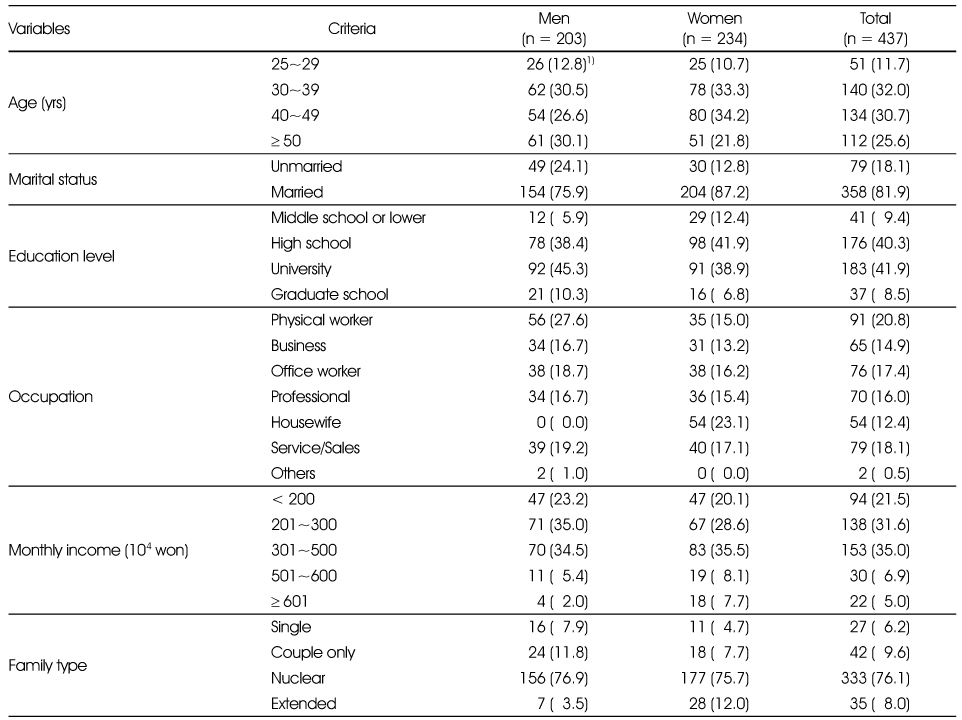
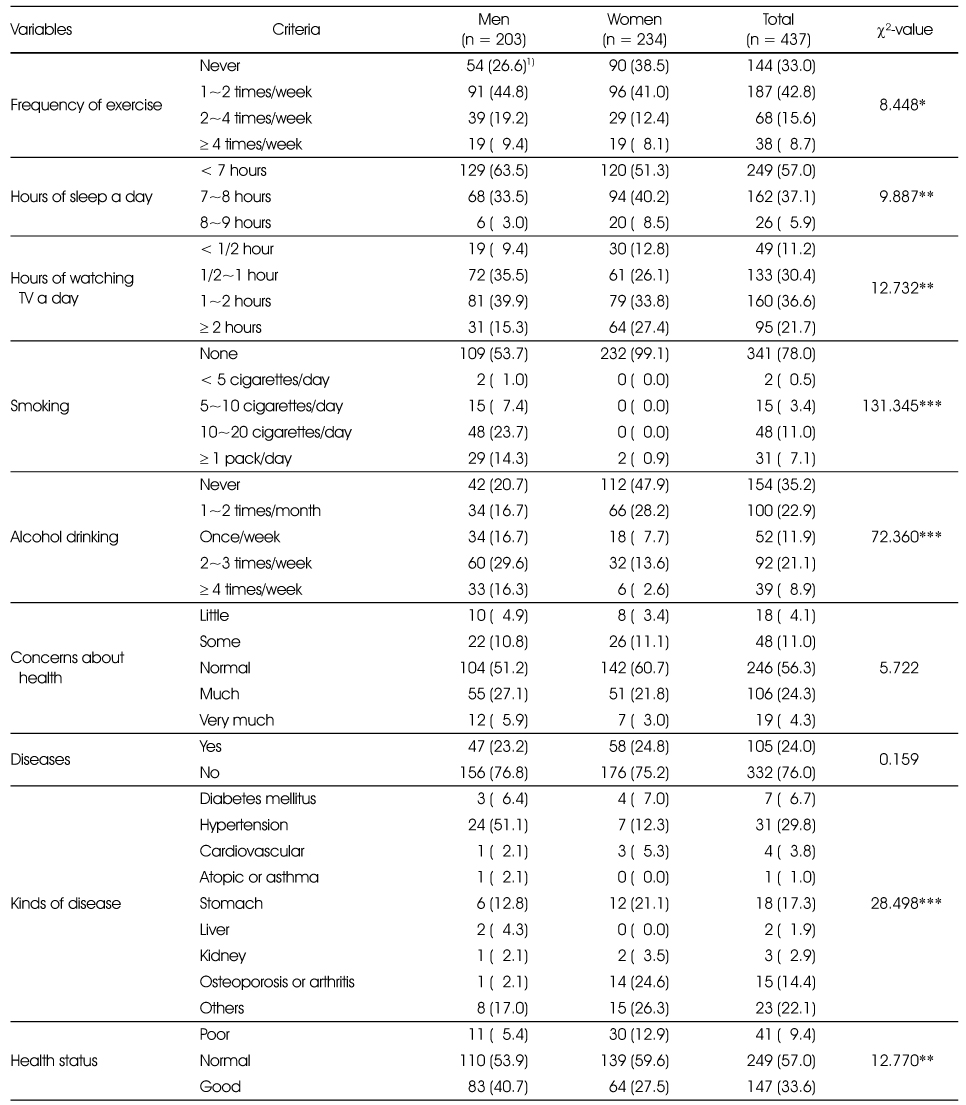
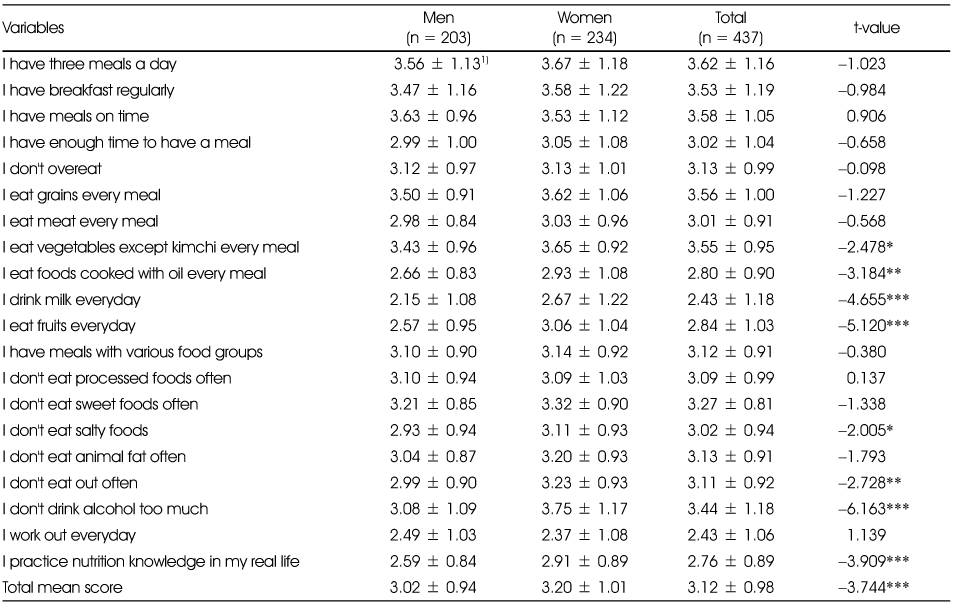

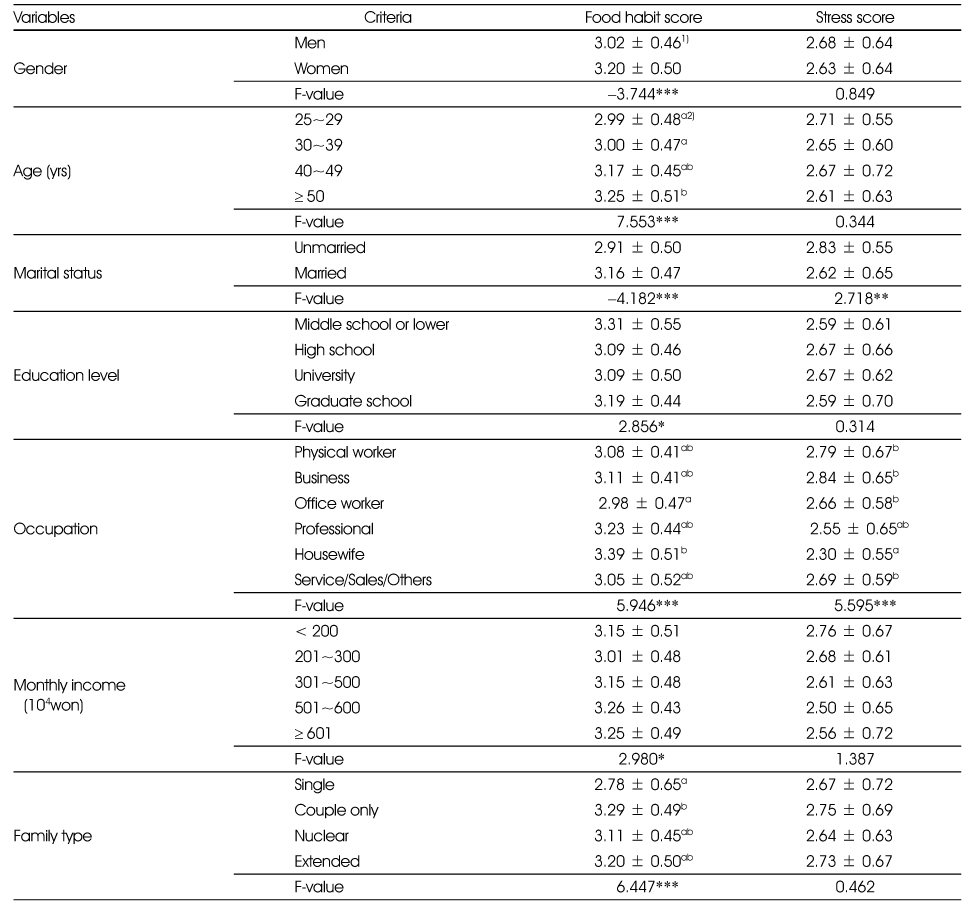
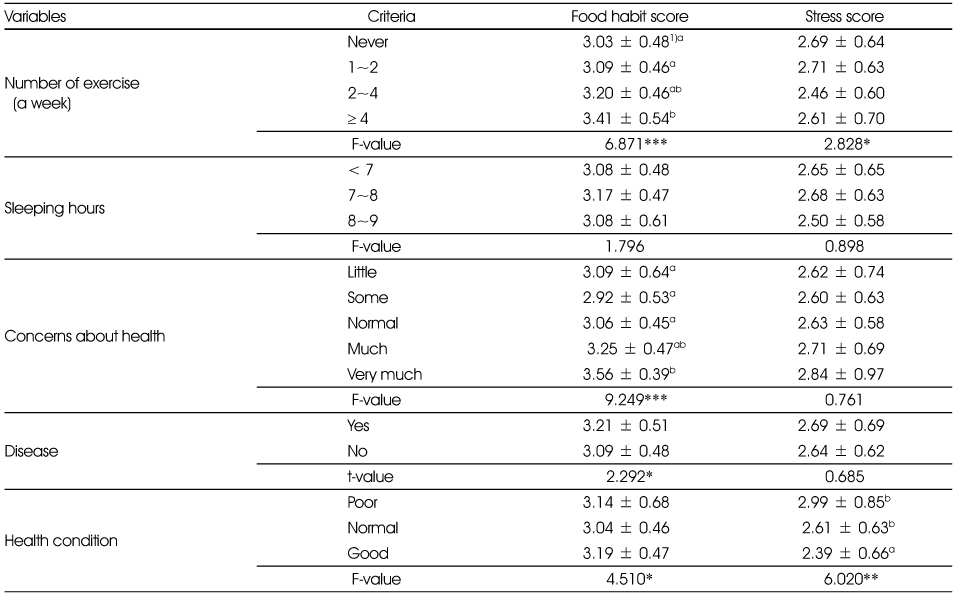
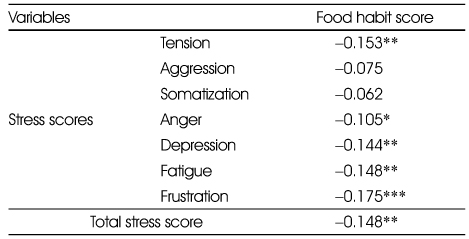
 PubReader
PubReader Cite
Cite


